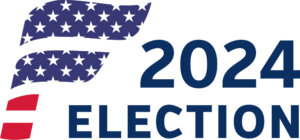Exclusive: In new poll, US Jews say Trump more supportive of Israelis but Harris better on Gaza war
Antisemitism and the war rank high in making presidential choice, though behind democracy, economy

People watch the debate in September between Democratic presidential nominee, Vice President Kamala Harris, and Republican presidential nominee, former President Donald Trump. Photo by Mario Tama/Getty Images
American Jews think Vice President Kamala Harris would handle the Israel-Hamas war better than former President Donald Trump by a wide margin — 54% to 36% — according to a new poll, but most also see Trump as more supportive of Israelis.
 The national poll, conducted for the Forward by CHIP50, an academic consortium of experts in public opinion surveys, found that 65% of U.S. Jews think Trump only or mostly supports Israelis over Palestinians, while 42% believe Harris offers “equal support to both.”
The national poll, conducted for the Forward by CHIP50, an academic consortium of experts in public opinion surveys, found that 65% of U.S. Jews think Trump only or mostly supports Israelis over Palestinians, while 42% believe Harris offers “equal support to both.”
The survey suggested that concerns about antisemitism and the war are weighing heavily in Jews’ choices for president this fall, though other issues — in particular, the preservation of democracy and the economy — concern them even more.
And the poll suggested that Harris may be struggling to lock in what has been a reliably Democratic voting bloc for decades: 62% of Jewish adults who plan to vote in November are backing her. That would be significantly below what President Joe Biden got in 2020 (77% or 68%, depending on which exit poll you believe) and Hillary Rodham Clinton’s Jewish support in 2016 (about 70% according to two exit polls).
Harris’ support in this poll is also lagging other recent surveys of American Jews. The CHIP50 researchers and other experts said that is likely because this poll, of 907 Jews 18 and over, included people who did not vote in 2020, and are therefore somewhat less likely to this year. Remove them, and her support rises to 64%. If you also take out those who said they were unsure who they’d pick, Harris had 67% of the remaining Jews surveyed.
“They’re pulling her down pretty substantially,” Jamie Druckman, a political science professor at the University of Rochester and a CHIP50 principal investigator, said of those who didn’t vote last time.
The poll was conducted online from Aug. 30 to Oct. 8, with support from the Knight Election Hub. It has an overall margin of error of plus or minus 3.3% for the Jewish sample, which is part of a larger survey of more than 27,000 Americans adults. (Detailed survey methodology is available on the CHIP50 website.)
Jews comprise 2% of the American population, but are reliable voters and account for as much as 3% of the electorate in swing states like Pennsylvania, where about 300,000 voted in 2020 (Biden beat Trump by 81,660).
In this year’s exceedingly tight presidential race, the campaigns have targeted Jewish voters in earnest.
In an online ad, Democrats accuse Trump of praising antisemites, and highlight a speech last month in which he said Jews would be to blame if he loses. Harris’ Jewish husband, Doug Emhoff, and the Jewish governor of Pennsylvania, Josh Shapiro, have been telling Jewish groups that her support for Israel and commitment to combating antisemitism is rock solid. Harris and Emhoff planted a pomegranate tree at the vice president’s residence in honor of the victims of Oct. 7 on the anniversary last week.
Trump, meanwhile, has claimed in a number of speeches that the Hamas attack on Oct. 7 never would have happened had he been president and that Israel will be obliterated within two years if Harris wins. Last week he visited the gravesite of the Lubavitcher Rebbe to mark the attack's anniversary. His running mate, Sen. JD Vance of Ohio, has implied that Harris chose Minnesota Gov. Tim Walz instead of Shapiro in part because of antisemitism.
Three weeks before the election, the Forward-CHIP50 poll sheds light on what’s on Jewish voters’ minds.
Israel and the war
The seeming disconnect between American Jews’ preference for Harris' approach to the war in Gaza and belief that Trump is more supportive of Israelis makes sense when viewed in the context of other survey results.
The largest group of Jews, 37%, want the U.S. to support Israelis and Palestinians equally. They outnumber the 31% who think it should mostly support Israelis and the 24% who think it should only support Israelis. (The smallest group, 6%, think U.S. policy should mostly or only support Palestinians, including 2% who think the U.S. should only support Palestinians.)
Asked about Harris’ views, 34% said she mostly or only supports Israelis (compared to 65% regarding Trump); 25% said she only or mostly supports Palestinians (14% said the same about Trump); and 42% said she offers “equal support to both” (Trump: 21%).
"There is likely a sizable number of Jewish voters who feel more aligned with Harris because they perceive her to be relatively even-handed with respect to the conflict,” said David Lazer, a political science and computer science professor at Northeastern University, and one of CHIP50’s principal investigators. ”Some voters also support her despite the fact that they are more closely aligned with Trump on Israel because they are closer to her on other issues."
Ann Lewis, co-chair of the Democratic Majority for Israel, said Harris “hasn’t had as much time to establish herself as a great friend of Israel” because she has been in the national spotlight for less time than Trump. Lewis, who served as White House communications director for President Bill Clinton, also posited that American Jews appreciate Harris’ “calm, serious” approach and distrust Trump’s bluster.
But Ari Fleischer, who served as press secretary to former President George W. Bush, had a simpler analysis: partisanship. “American Jews are overwhelmingly Democratic,” he noted, “so of course they’re more inclined to express support for Harris, even though they think Trump is stronger on Israel.”
Antisemitism and the war rank high as priorities
The poll also shows that antisemitism and the Israel-Hamas war are among the top concerns for Jewish Americans as they make their choices for president. Asked to rank issues from 1 (“not important at all”) to 10 ("extremely important"), more than 70% of American Jews give the war an 8, 9 or 10. That compares to less than 45% of non-Jews.
On antisemitism, 73% of American Jews surveyed rated it an 8, 9 or 10. (Less than 40% of non-Jews did so, making antisemitism — perhaps unsurprisingly — the issue with the largest margin between Jews and non-Jews.)
These two were among 17 issues, including abortion, crime, immigration and the economy, listed in the survey.
Preserving democracy was the top priority for the Jews surveyed, with 79% ranking it an 8, 9 or 10, while the economy was No. 1 for the non-Jews (81% gave it 8, 9 or 10). Moreover, 57% of Jews ranked democracy 10 out of 10, compared to 43% of non-Jews. (Economy was close behind for Jews, with 52% giving it a 10 out of 10, and with 55% of non-Jews ranking it a 10.)
Democracy also topped the priority list for American Jews in a September poll that GBAO Strategies conducted on behalf of the Jewish Democratic Council of America, with 44% ranking it as one of the two most important issues fueling their presidential choice; the second most popular in that survey was abortion, with 28%.
Abortion also stands out in the CHIP50 poll for American Jews: 48% rate it a 10 and 68% give it an 8, 9 or 10. For non-Jews, those figures are about 10 percentage points lower.
But that GBAO poll found only 9% ranking Israel among their top two issues (for the Orthodox Jews in the poll, it was higher, 31%) and 15% antisemitism. The Forward-CHIP50 survey did not ask respondents to choose their top issues, but to consider each separately; respondents could rank as many as they liked an 8, 9 or 10.
“Many issues rank as important by this measure,” Lazer noted.
The war in Ukraine, home to tens of thousands of Jews and initially the focus of considerable Jewish philanthropy after Russia’s 2022 invasion, has remained a priority for more Jews than others: 61% rated it an 8, 9 or 10, compared to 46% of non-Jews.
Harris vs. Trump
CHIP50 — CHIP stands for the Civic Health and Information Project, 50 because it conducts 50-state surveys — began in April 2020, doing polls related to the pandemic. It includes scholars from Northeastern, Rutgers, Harvard and the University of Rochester.
The Knight Election Hub provides free resources to newsrooms to help consumers make voting decisions based on accurate, nonpartisan information. The Hub recruited CHIP50 and the MassINC Polling Group to work with 10 newsrooms, including the Forward, Spotlight PA, The Haitian Times, and Wisconsin Watch.
The poll departs somewhat from other recent surveys of American Jews on the most straightforward question: Who would you vote for if the election were held today?
A national GBAO poll released last month had Harris leading Trump among Jews 68% to 25% (compared to 62% in this survey, or 64% when those who said they did not vote in 2020 were removed). GBAO had the national vote among Jews split 72% to 25% for Harris when those voting for third parties or still undecided were removed, compared to 67% in this poll.
Our poll found that Trump’s support among Jews has held steady since 2020: 31% of those surveyed who said they voted then had backed him, and 31% of those who plan to vote in November do as well.
Without presenting evidence, Trump, in a speech to a largely Jewish audience last month, said he has seen polling that has him at 40% of the Jewish vote. It was in that same address that he called Jews ungrateful for his support for Israel and said that if he loses, they would be in great part to blame — a remark that many called antisemitic.
Fleischer, the Republican former White House official, said any shift among Jews to the GOP could be significant in such a close election.
“The only thing that matters is inroads, and Trump is making meaningful inroads into a key Democratic constituency,” he said. “Trump will never win the Jewish vote,” he added. “But he likely will do better than most Republicans.”
Arno Rosenfeld contributed to this article.




















